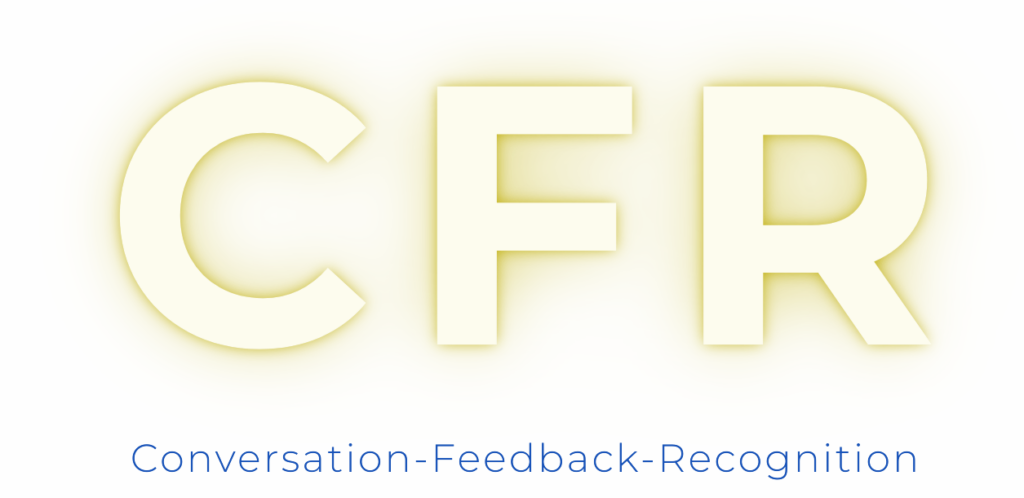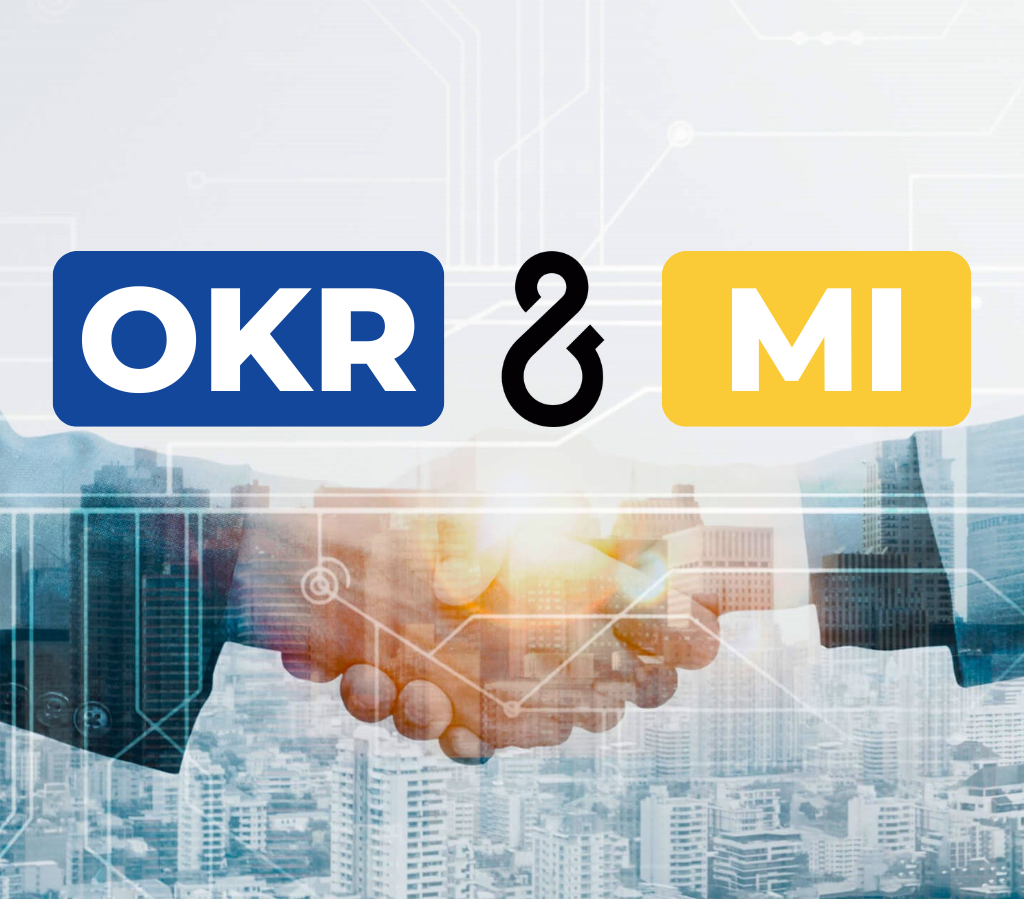Many young people have been and are wondering how to achieve success at work? How to turn vague goals into reality? The answer is OKRs – a modern management method being applied by many leading companies worldwide.
OKRs (Objectives and Key Results) is a modern management style that helps individuals or organizations on their journey to success in the modern context by clearly defining their goals and focusing on the most important tasks to achieve that goal. OKRs are not only a tool to help you define goals clearly but also a key for you to develop yourself and achieve outstanding achievements on that path. You also need to know that it is the CFRs principle – Conversations, Feedback, and Recognition – that is the “spiritual leader” of the development journey.
While OKRs help define what you want to achieve in a focused, synchronous, and truly important way, CFRs will play a key role in creating a suitable environment to nurture and facilitate those goals. This is achieved through open dialogue, constructive feedback, and a culture of subtle recognition.

Dialogue – Feedback – Recognition are 03 extremely important components in building and developing a sustainable team
This principle is inspired by the vision of a work environment or personal project that is strongly developed and comprehensively meets the value of CFRs. This greatly supports OKRs in managing “dry” goals into a continuous cycle of progress and improvement, ensuring you always focus on what businesses need to prioritize, helping the team keep the “fire” of motivation and the whole organization moving in the same direction. Whether an individual is in the process of building a career, developing personal skills, or improving the ability to lead a high-performance team, CFRs will become a solid foundation for motivation to promote excellence.
Conversations: The Power of Connection
Have you ever had difficulty working in a group? Have you ever found it difficult to present and defend your opinion so that other members agree and support it? Dialogue is the key to solving these problems subtly.
Proactively talking with colleagues, sharing ideas, and finding the best solution together are simple but extremely effective ways to improve this problem.
Dialogue and intelligent communication are considered one of the important factors for the development of modern humans. Communicating, creating languages, and using them skillfully are believed to help nurture understanding, build relationships and unleash potential, forming social organizations to this day.
1. Proactive Dialogue Promotes Progress
In everyday situations, when working in a team or organization, each member can have different perspectives or different ideas to contribute to the common work.
Proactive dialogue, proactive sharing, and exchange of opinions between members will help update progress, share challenges, and explore creative solutions together.
Dialogue not only helps to update progress but also creates opportunities to deeply understand the problem, thereby making more appropriate decisions. That is also how the team clarifies expectations, minimizes misunderstandings, and promotes work efficiency.
2. Collaboration, Not Commands
At work, dialogue is essential for collaboration, innovation, and problem-solving. They allow you to share knowledge, brainstorm ideas, and work together effectively to achieve common goals.
Regularly talking to your manager or mentor can help you stay aligned with your goals, identify areas for development, and overcome challenges.
Therefore, dialogue in CFRs always needs to be a two-way street. Dialogue in today’s context is mostly no longer top-down directives (top-down or waterfall), especially with Gen Z – the new main workforce.

Active communication helps significantly reduce unnecessary misunderstandings
To get the team to contribute positively together, prioritize fostering flexible leadership, such as Situational Leadership, and build an open, collaborative environment where all voices are heard.
To create a collaborative environment, in many modern organizations, instead of leaders giving orders, they can organize “co-creation” sessions or combine the application of thought-provoking questions or open-ended questions.
3. The Power of Active Listening
For organizations, fostering a culture of open communication promotes a sense of community and belonging. It encourages employees to share ideas freely, collaborate effectively, and contribute their unique talents to the success of the organization.
Dialogue helps you connect with others on a deeper level, fostering empathy and understanding. They allow you to share your thoughts and feelings, gain new perspectives, and build meaningful relationships.
Conversations that bring real effectiveness often come from active listening. Instead of criticizing, rebutting, or ignoring, managers need to listen carefully, ask clarifying questions, and hold meetings when necessary to unify information or adjust processes.
When members feel that they are listened to and respected, they are more likely to contribute positively and enthusiastically present.
To increase communication effectiveness, pay attention to body language, expressions, and use feedback signs when communicating. This will contribute to building stronger connections between team members and finding optimal solutions with contributions from the collective.
Feedback: The Foundation for Growth
Have you ever experienced the feeling of receiving feedback from colleagues or superiors and feeling like you were “awakened”?
Aha! That’s right, Feedback is not merely praise or criticism; It is the most powerful and effective value for each individual and organization to continuously improve to go further on the development journey.
When feedback is recognized as constructive and sincere, it becomes a valuable source of energy, giving you more perspective, having the opportunity to understand yourself better, promptly adjust your direction and improve yourself.
1. Transforming Feedback into Energy
Imagine you are a member of a team, having an internal meeting to present and update your assigned tasks.
The direct manager with many years of experience, instead of saying: “This solution is not suitable for the goal. Need to do it again”, will give suggestions: “You did this step well, but if you try another approach to the problem, the results may be better”. Thus, in this simple example, instead of criticizing, effective feedback focuses on the effective aspect, giving you the feeling of being accompanied and guided.
Feedback is a superior and advanced approach, even in the event of an error, presented as a way to recognize effort and promote creativity. Feedback, when communicated correctly, not only helps improve performance but also builds confidence and a positive attitude to face bigger challenges. It is like a compass, helping you orient and optimize your journey. When feedback is done right, each individual not only improves but also becomes the best version of themselves in the long run.
2. Clear and Focus on Action
For effective feedback, the content and how feedback is given should not be vague or too general.
Instead of saying: “The report is not good,” switch to “Your report is very detailed, if there is an additional summary page of important points to note at the beginning, the reader will be easier to grasp information”. In the above example, giving specific feedback and focusing on an expected result will help the recipient feel recognized and willing to improve instead of being criticized.
When the feedback content is clear, it helps create transparency, minimizes misunderstandings, and helps individuals easily identify necessary actions. A work culture with specific, clear feedback will also promote confidence and self-adjustment ability of each member, helping them progress faster.

Feedback becomes more effective with clear and specific improvement actions
3. Timely and Consistent Support
Feedback is like caring for trees – if you wait too long to water, the tree may have withered. Conversely, if you give too much water, the tree can be waterlogged.
Giving timely suggestions, right at the time the problem occurs or when commendable behavior is shown, will increase the value and effectiveness of the feedback.
Many businesses are having performance reviews every 06 months or at the end of the year. However, the value of this can hardly replace monthly or even weekly conversations, to promptly raise morale, encourage achievements, or help the team improve work quality immediately when needed.
Consistency in feedback also plays an equally important role. This is a factor to ensure the continuity of work performance while building trust and commitment in the team. It helps members feel that they are cared for and accompanied in their development journey sincerely. This is especially important when working with multi-generational teams, and each individual may have different expectations and working styles.
4. Nurturing a Constructive Feedback Culture
Feedback is not merely the “responsibility and obligation” of superiors to employees but should be supported and developed as a positive culture throughout the organization. An environment where everyone feels comfortable giving and receiving feedback will create stronger engagement. This not only promotes personal development but also helps the entire organization continuously innovate and adapt to new challenges.
Receiving appropriate, specific, timely, and constructive feedback is a beauty in a positive work culture. This helps each recipient to clearly identify their strengths and weaknesses, thereby developing skills and affirming their value in the team.
Many studies and analyzes of leadership capacity also agree with the assertion that feedback will be an invaluable resource, providing a fresh perspective and helping all members of any organization to continuously improve their capacity, always in a state of “learning and improvement” and ready to break through to lead.
Recognition: Promoting Motivation and Engagement
On the journey to conquer dreams and assert themselves, besides constant efforts, being recognized plays an extremely important role, a strong motivation to push us to success.
According to a study by author Todd Kunsman, there are some interesting figures about recognition at work and the significant impacts that managers and business leaders need to consider. Specifically, when experimenting with doubling the number of employee recognitions, the team’s work quality can increase by 24%, the engagement rate increases by 27%, and work performance improves by 10%.
According to Maslow’s hierarchy of needs, the need to be respected and feel valued (level 4) is very important. This includes recognition at work, recognition of achievements, development, and promotion. Instead of working mechanically, recognition helps employees have the motivation to work better, helps employees put more enthusiasm and energy into work.
1. Recognition is not just praise
Recognition is not merely superficial praise but a powerful tool to motivate and morale work. It can be expressed in many different forms, suitable for each individual and context. A sincere thank you, an encouraging nod, or bigger actions like material rewards, promotion opportunities, or public recognition all bring value. Applying a variety of forms of recognition helps ensure that every effort, big or small, is appropriately and respectfully recognized.
Besides recognition from superiors, recognition among colleagues is also very important. A compliment, an encouragement, or timely support during difficult times at work are all expressions of recognition, contributing to building a more cohesive working environment.
Success lies not only in the final result but also in the journey of effort. Appreciating and recognizing the whole process besides the results will help individuals feel encouraged and maintain motivation even when they have not achieved their goals.
2. Celebrate Success, Big or Small
A culture of recognizing success should not just focus on the ultimate achievements but should spread to even small milestones of victory. For example, praising a new employee for being proactive in a project or acknowledging an individual’s efforts during a difficult time not only boosts their morale but also sends a message to everyone that: “Every effort is appreciated”
When everyone in the organization feels recognized, they will be motivated to contribute more, thereby building a meaningful and effective working environment.

All achievements deserve to be shared and encouraged together
3. Building a High-Performance Culture
Recognition is recognized by many businesses and HR managers as an important foundation for creating a high-performance culture at work. When an individual feels valued, they tend to work hard not only for personal gain but also for the common goal. Therefore, an environment where recognition is an integral part of encouraging and supporting cooperation, idea-sharing, and creativity among all members. More importantly, gradually developing over time, this culture will become a driving force for innovation and create a sustainable organization.
A workplace where achievements are sincerely recognized, where everyone feels supported and encouraged. It is recognition that will be the spark that ignites motivation, helping individuals and organizations reach new heights.
4. Applying Recognition in Work and Life
Recognition is not only important at work but also needs to be practiced daily in everyone’s life. First, acknowledge yourself. Learning to be proud of even the smallest achievements helps you stay motivated and boost positive energy. Recognizing others is equally important. By showing sincere recognition to those who have helped and accompanied you, you spread positive value in the community.
Look for work environments with a culture of recognition. Working in a place where recognition is valued will help you maximize your potential and feel more meaningful work. Diversifying forms of recognition is also essential. Recognition is not only praise but also a sincere thank you, an encouraging nod, or more formal forms such as material rewards, promotion opportunities, or public recognition.
Recognition from colleagues is also extremely important. It can be a word of encouragement, timely help, or simply a compliment on a creative idea. Finally, acknowledge the entire effort process, not just the end result. This helps you feel valued even if you haven’t reached your final goal, while encouraging you to keep trying harder.
All of this contributes to creating a positive living and working environment where everyone feels recognized and motivated to achieve higher achievements.
CFRs – Building a Strong Team
CFRs are increasingly playing an important role in building strong teams and creating a collaborative and positive environment. CFRs are the heartbeat of OKRs (Objectives and Key Results), not only helping to pursue goals purposefully but also driving a cycle of continuous improvement and achievement. By embracing Dialogue, Feedback, and Recognition, you will move from simply setting goals to promoting sustainable development.

A transparent and open work culture is a solid foundation for sustainable development.
In business and in life, CFRs empowers you and your team members, organization, or wider social relationships to adapt and overcome challenges, marking anniversaries at every milestone. Integrating CFRs into OKRs methods helps change the approach to success – turning goals into stepping stones to greater achievements.
Recognition and recognition play an essential role in enhancing your journey. Recognition comes not only from superiors but also from colleagues, helping everyone feel valued and motivated. Be specific when recognizing and go beyond mere thank-yous. Recognize success right at the time it happens, no matter how small, to create engagement and improve morale. Start leveraging CFRs today and see how it unlocks potential and inspires growth at every turn. CFRs will help you turn goals into reality and build a strong, engaged, and always successful team.





